Upcoming Croat Presidential Election Scheduled for December 29

Croatia will hold a presidential election on December 29, with incumbent President Zoran Milanović seeking reelection against Dragan Primorac of the governing conservatives. If no candidate secures a majority, a runoff will occur two weeks later. Tensions are heightened due to recent corruption allegations involving Health Minister Vili Beroš and Milanović’s opposition to government policies regarding Ukraine.
Croatia is set to conduct a presidential election on December 29, as announced by Prime Minister Andrej Plenković. The formal arrangements for the vote have yet to be established, but should no candidate secure an outright majority on the initial date, a runoff election will follow in two weeks. Incumbent President Zoran Milanović is expected to seek reelection, supported by the opposition Social Democratic Party, while Dragan Primorac, representing the governing conservatives, is anticipated to be his primary challenger. Tensions are high in the political landscape, particularly between Milanović and Plenković, who are known rivals. Milanović has vocalized his opposition to the government’s backing of Ukraine and the involvement of Croatian troops in NATO-led training operations. This political climate is further complicated by recent corruption allegations concerning Health Minister Vili Beroš, who was arrested earlier this week, causing upheaval within the conservative administration. A diverse array of candidates from across the political spectrum is expected to join the race as the election date approaches.
The upcoming presidential election in Croatia is crucial for determining the leadership direction of this European Union member state. Given the current stark political rivalry between incumbent President Zoran Milanović and Prime Minister Andrej Plenković, the election serves as a referendum on many contentious issues, including national defense policies and allegations of corruption within the government. The outcome will affect Croatia’s ongoing participation in international alliances and governance strategies. Moreover, the political landscape may shift further as other candidates are introduced, adding complexity to an already dynamic electoral scenario.
In conclusion, the presidential election in Croatia scheduled for December 29 represents a significant moment for the nation, highlighting the fierce rivalry between the incumbent president and the ruling party’s candidate. The election occurs against a backdrop of political discord over international policy and internal corruption scandals. As various candidates prepare to enter the race, the election’s outcome will likely influence Croatia’s political trajectory in both domestic and international spheres.
Original Source: abcnews.go.com








